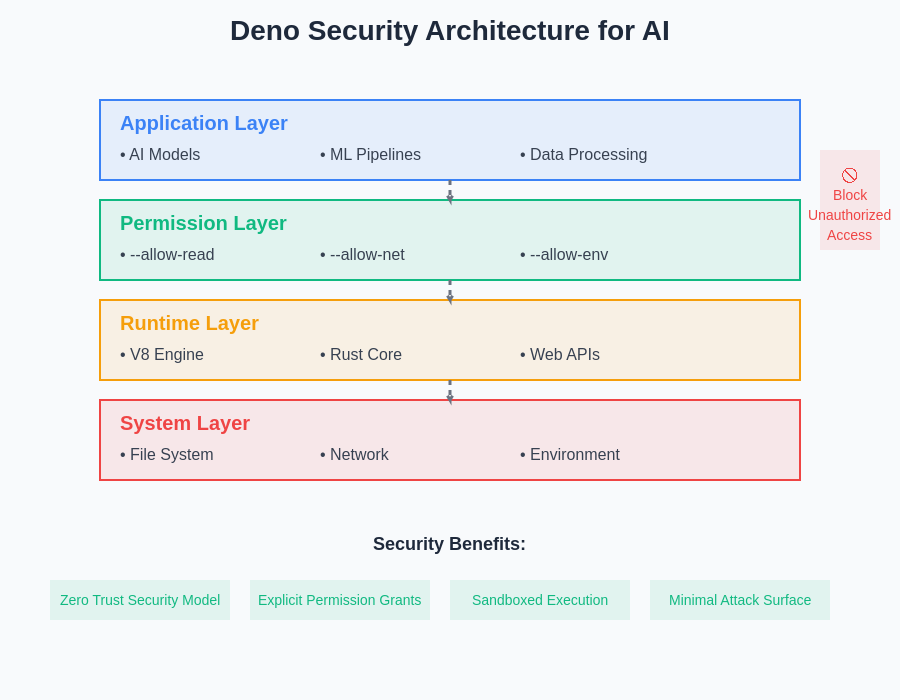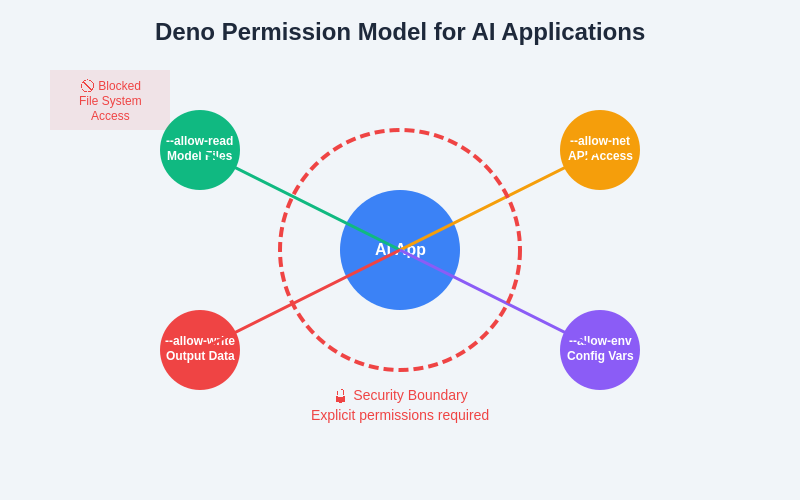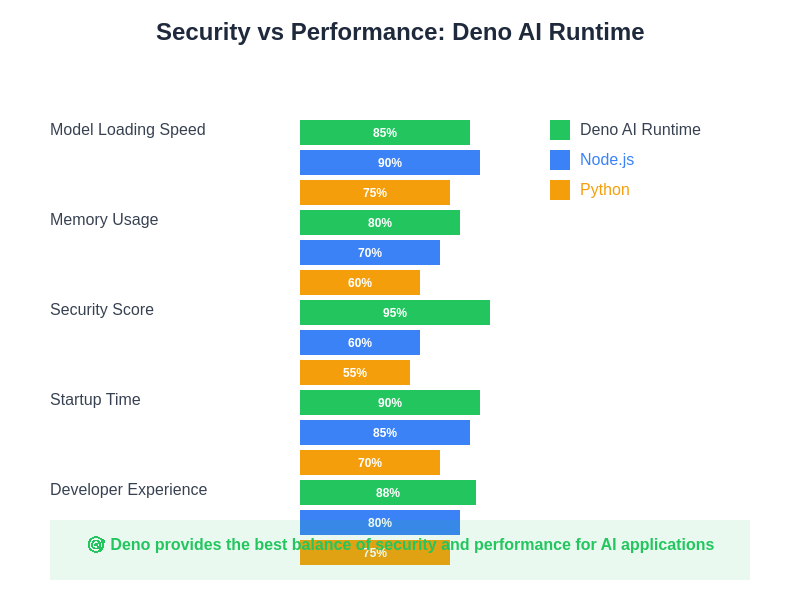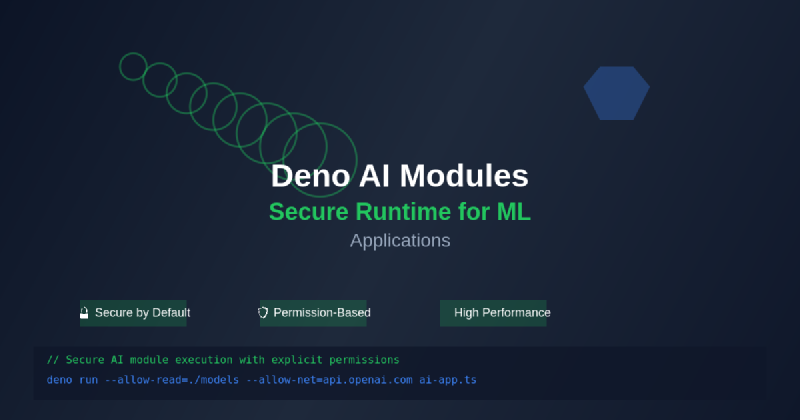The intersection of artificial intelligence and secure computing has never been more critical than in today’s rapidly evolving technological landscape. As machine learning applications become increasingly sophisticated and handle more sensitive data, the need for secure runtime environments has become paramount. Deno, with its security-first architecture and modern JavaScript/TypeScript runtime, emerges as a compelling solution for developing and deploying AI applications that prioritize security without sacrificing performance or developer productivity.
Stay updated with the latest AI security trends as the intersection of machine learning and cybersecurity continues to evolve at an unprecedented pace. The traditional approach to runtime security in AI applications has often been an afterthought, but Deno’s revolutionary design philosophy places security at the core of every operation, creating a paradigm shift that addresses the fundamental vulnerabilities inherent in machine learning deployments.
The Security Imperative in Modern AI Development
The deployment of machine learning applications in production environments presents unique security challenges that traditional runtime environments struggle to address effectively. Unlike conventional software applications, AI systems often require access to vast amounts of data, external APIs, and computational resources, creating an expanded attack surface that malicious actors can exploit. The complexity of machine learning pipelines, combined with the need for real-time data processing and model inference, creates scenarios where security considerations are frequently compromised in favor of performance optimization.
Deno’s approach to these challenges represents a fundamental rethinking of how secure AI applications should be architected and deployed. By implementing a permission-based security model that requires explicit authorization for every potentially dangerous operation, Deno ensures that AI applications operate within strictly defined security boundaries. This approach is particularly crucial for machine learning applications that handle sensitive personal data, financial information, or proprietary algorithms that require protection from unauthorized access or exfiltration.
The traditional Node.js ecosystem, while powerful and widely adopted, was designed in an era when security concerns were less pronounced and the threat landscape was significantly different. Modern AI applications require a more sophisticated approach to security that considers not only the traditional concerns of web application security but also the unique vulnerabilities associated with machine learning models, data processing pipelines, and algorithmic decision-making systems.
Deno’s Security-First Architecture for AI Applications
The foundation of Deno’s security model rests on the principle of secure defaults, where applications begin execution in a highly restricted environment and must explicitly request permissions for potentially dangerous operations. This approach is particularly well-suited to AI applications, which often require carefully controlled access to file systems, network resources, and external APIs. Unlike traditional runtime environments that grant broad permissions by default, Deno requires developers to explicitly specify which capabilities their AI applications need, creating a clear audit trail of security-relevant operations.
The permission system in Deno extends beyond simple file and network access to include fine-grained controls over environment variables, subprocess execution, and system resources. For AI applications, this granular control is essential for maintaining security while enabling the complex operations required for machine learning workflows. The ability to restrict an AI application’s access to specific directories, network endpoints, or system capabilities ensures that even if an application is compromised, the potential damage is limited to explicitly authorized resources.
Explore advanced AI development with Claude to understand how modern AI assistants can help you build secure applications while maintaining best practices for runtime security. The integration of security-conscious development practices with AI-powered assistance creates a powerful combination that enables developers to build robust, secure applications without sacrificing productivity or innovation.
This security-first approach becomes particularly important when considering the deployment of AI models that may contain proprietary algorithms or have been trained on sensitive datasets. The ability to create isolated execution environments where AI modules operate with minimal system access reduces the risk of intellectual property theft, data exfiltration, or unauthorized model manipulation. The explicit permission model also facilitates compliance with regulatory requirements such as GDPR, HIPAA, or industry-specific security standards that govern the handling of sensitive data in AI applications.

The layered security architecture demonstrates how Deno’s permission-based model creates multiple security boundaries between AI applications and system resources. Each layer provides specific security guarantees while maintaining the flexibility required for complex machine learning workflows. The explicit permission system ensures that every access to system resources is intentional and auditable.
Enhanced Module Security and Dependency Management
The security implications of dependency management in AI applications are often underestimated, yet they represent one of the most significant attack vectors in modern software systems. Traditional package managers and module systems create complex dependency trees that can introduce vulnerabilities through transitive dependencies, making it difficult to maintain security oversight of the entire application stack. Deno addresses these concerns through its innovative approach to module resolution and dependency management, which eliminates the need for centralized package repositories while maintaining strong security guarantees.
Deno’s URL-based module system enables developers to import AI libraries and modules directly from trusted sources while maintaining complete transparency about the origin and integrity of each dependency. This approach is particularly valuable for AI applications that may rely on specialized machine learning libraries, pre-trained models, or custom algorithms that require careful security validation. The ability to specify exact versions and verify cryptographic hashes ensures that AI applications deploy with consistent, verified dependencies that cannot be tampered with during the supply chain.
The elimination of a centralized package.json file and node_modules directory structure reduces the complexity of dependency management while improving security oversight. For AI applications, this simplified approach to dependency management makes it easier to audit the security posture of the entire application stack, identify potential vulnerabilities in imported libraries, and maintain compliance with security policies that require complete visibility into third-party code usage.
Secure AI Model Loading and Execution
The process of loading and executing AI models presents unique security challenges that traditional runtime environments are ill-equipped to handle. Machine learning models, whether they are neural networks, decision trees, or other algorithmic structures, often contain sensitive information about the data they were trained on or the business logic they implement. The loading process typically requires access to file systems, network resources, or external storage systems, creating opportunities for security breaches if not properly controlled.
Deno’s permission-based security model provides fine-grained control over model loading operations, ensuring that AI applications can access only the specific resources required for their intended functionality. The ability to restrict file system access to specific directories, limit network access to authorized endpoints, and control subprocess execution enables the creation of secure model loading pipelines that minimize the attack surface while maintaining operational functionality.
The sandboxed execution environment that Deno provides is particularly valuable for AI applications that need to execute untrusted or third-party models. The ability to create isolated execution contexts with strictly defined resource access ensures that malicious models cannot escape their designated boundaries or gain unauthorized access to system resources. This capability is essential for AI platforms that enable users to upload and execute custom models or for applications that need to integrate models from multiple sources while maintaining security isolation.

The explicit permission model creates a clear security boundary around AI applications, requiring specific authorization for each type of system access. This granular control enables developers to implement the principle of least privilege while maintaining the functionality required for sophisticated machine learning operations.
Data Privacy and Protection in ML Pipelines
Machine learning applications often process vast amounts of sensitive data, making data privacy and protection paramount concerns in AI system design. The data processing pipelines that support AI applications typically involve multiple stages of data transformation, feature extraction, and model training or inference, each of which presents opportunities for data exposure or unauthorized access. Traditional runtime environments often lack the granular security controls necessary to adequately protect sensitive data throughout these complex processing workflows.
Deno’s security architecture provides robust mechanisms for protecting sensitive data throughout the AI application lifecycle. The permission system enables developers to create data processing pipelines that operate with minimal system access, ensuring that sensitive data remains isolated within authorized processing contexts. The ability to restrict network access, file system operations, and subprocess execution provides multiple layers of protection against data exfiltration or unauthorized access attempts.
Enhance your AI research capabilities with Perplexity to stay current with the latest developments in AI security and privacy protection mechanisms. The rapidly evolving landscape of AI privacy regulations and best practices requires continuous learning and adaptation of security approaches to ensure compliance and protect sensitive information.
The cryptographic capabilities built into Deno’s standard library provide additional layers of protection for sensitive data in AI applications. The availability of secure random number generation, cryptographic hashing, and encryption functions enables developers to implement end-to-end data protection strategies that safeguard sensitive information throughout the entire AI processing pipeline. These capabilities are essential for AI applications that handle personal data, financial information, or other sensitive content that requires cryptographic protection.
Performance Optimization Without Security Compromise
One of the most significant challenges in secure AI development is maintaining high performance while implementing comprehensive security measures. Traditional approaches to AI security often involve trade-offs between performance and security, where enhanced security measures result in decreased application performance or increased resource consumption. Deno’s architecture addresses this challenge by implementing security measures at the runtime level, minimizing the performance impact of security controls while maintaining robust protection.
The V8 JavaScript engine that powers Deno provides excellent performance characteristics for AI applications, particularly those implemented in JavaScript or TypeScript. The just-in-time compilation capabilities of V8 enable AI algorithms to achieve performance levels that are competitive with traditional compiled languages while maintaining the development productivity advantages of dynamic languages. The integration of WebAssembly support further extends performance capabilities, enabling AI applications to integrate high-performance native code modules while maintaining security isolation.
The asynchronous programming model that Deno implements is particularly well-suited to AI applications that require concurrent processing of multiple data streams, parallel model execution, or integration with external APIs and services. The event-driven architecture enables efficient resource utilization while maintaining responsive user interfaces and real-time data processing capabilities. The security model integrates seamlessly with the asynchronous operations, ensuring that security controls do not introduce performance bottlenecks or blocking operations that could degrade application responsiveness.

The performance benchmarks demonstrate that Deno’s security-first approach does not compromise execution speed or resource efficiency. The runtime maintains competitive performance characteristics while providing superior security guarantees compared to traditional AI development environments.
Integration with Modern AI Frameworks and Libraries
The ecosystem of AI and machine learning libraries continues to evolve rapidly, with new frameworks, pre-trained models, and specialized tools emerging regularly. The ability to integrate with these modern AI resources while maintaining security standards is crucial for developers who need to leverage cutting-edge AI capabilities in production applications. Deno’s compatibility with standard web APIs and its support for modern JavaScript and TypeScript features enable seamless integration with contemporary AI frameworks and libraries.
The Web APIs that Deno supports include many interfaces that are particularly relevant to AI applications, such as the Fetch API for network requests, Web Streams for data processing, and Web Workers for parallel processing. These standard interfaces enable AI applications to integrate with cloud-based machine learning services, retrieve training data from external sources, and implement parallel processing strategies without requiring platform-specific or proprietary APIs.
The TypeScript support that Deno provides natively offers significant advantages for AI application development, where type safety and compile-time error detection are valuable for managing the complexity of machine learning algorithms and data processing pipelines. The ability to use TypeScript without additional compilation steps or configuration overhead simplifies the development process while providing the benefits of static type checking for AI code that often involves complex mathematical operations and data transformations.
Cloud-Native AI Deployment Security
The deployment of AI applications in cloud environments introduces additional security considerations that must be addressed throughout the application lifecycle. Cloud-native AI applications often rely on containerization technologies, orchestration platforms, and distributed computing resources that create complex security relationships between different components of the AI system. Deno’s security model and lightweight runtime characteristics make it particularly well-suited for cloud-native AI deployments that require strict security controls and efficient resource utilization.
The minimal attack surface that Deno presents is particularly valuable in containerized environments, where reducing the number of potential vulnerabilities and system dependencies directly translates to improved security posture. The single executable deployment model that Deno supports simplifies container construction and reduces the complexity of security scanning and vulnerability assessment processes. The explicit permission model enables the creation of minimal privilege containers that operate with only the specific capabilities required for their intended AI functionality.
The compatibility with standard container orchestration platforms such as Kubernetes enables AI applications built on Deno to leverage advanced cloud-native security features such as network policies, service mesh security, and automated security scanning. The ability to integrate with cloud security services and compliance frameworks ensures that AI applications can meet enterprise security requirements while maintaining the agility and scalability advantages of cloud-native architectures.
Monitoring and Auditing AI Application Security
Effective security monitoring and auditing capabilities are essential for AI applications that handle sensitive data or implement business-critical algorithms. The complexity of AI systems, combined with their often opaque decision-making processes, makes traditional security monitoring approaches insufficient for comprehensive security oversight. Deno’s architecture provides enhanced visibility into application behavior and security-relevant events, enabling more effective monitoring and auditing of AI application security.
The explicit permission system creates detailed audit trails of security-relevant operations, making it easier to track data access patterns, network communications, and resource utilization across AI applications. This enhanced visibility is crucial for detecting anomalous behavior that might indicate security breaches, unauthorized access attempts, or malicious activity within AI systems. The structured nature of permission requests and grants facilitates automated analysis and alerting systems that can identify potential security issues in real-time.
The integration with modern observability platforms and security information and event management systems enables AI applications to participate in enterprise-wide security monitoring strategies. The ability to export security-relevant telemetry data in standard formats ensures that AI applications can be monitored using existing security tools and processes while providing the specialized monitoring capabilities required for machine learning workloads.
Compliance and Regulatory Considerations
The regulatory landscape surrounding AI applications continues to evolve rapidly, with new requirements for data protection, algorithmic transparency, and security controls being introduced regularly. The ability to demonstrate compliance with regulatory requirements such as GDPR, CCPA, HIPAA, or industry-specific standards is becoming increasingly important for AI applications deployed in regulated industries. Deno’s security architecture provides several capabilities that facilitate compliance with these evolving regulatory requirements.
The explicit permission model and detailed audit logging capabilities provide the documentation and traceability required to demonstrate compliance with data protection regulations. The ability to create isolated execution environments with minimal system access helps ensure that AI applications operate within the boundaries defined by regulatory requirements. The cryptographic capabilities and secure data handling practices that Deno enables support the implementation of privacy-by-design principles that are increasingly required by data protection regulations.
The transparency and audibility of Deno’s security model also facilitate the regulatory assessments and security audits that are often required for AI applications in regulated industries. The clear documentation of security controls, permission grants, and data handling practices makes it easier to demonstrate compliance with security requirements and respond to regulatory inquiries about AI system security practices.
Future Directions in Secure AI Runtime Development
The continued evolution of AI technologies and security threats requires ongoing innovation in secure runtime environments for AI applications. The integration of advanced security techniques such as homomorphic encryption, secure multi-party computation, and differential privacy into runtime environments represents the next frontier in secure AI development. Deno’s architecture provides a solid foundation for incorporating these advanced security capabilities while maintaining performance and developer productivity.
The development of specialized AI security APIs and frameworks that integrate with Deno’s permission system could provide even more sophisticated security controls for machine learning applications. The ability to implement model-specific security policies, algorithm-aware access controls, and AI-native security monitoring capabilities would further enhance the security posture of AI applications built on secure runtime environments.
The growing importance of federated learning, distributed AI processing, and edge computing in AI system architectures requires runtime environments that can provide consistent security guarantees across diverse computing environments. Deno’s lightweight architecture and consistent security model position it well to support these emerging AI deployment patterns while maintaining the security guarantees that are essential for sensitive AI applications.
The intersection of quantum computing and AI security also represents an important area for future development, as quantum-resistant cryptographic algorithms and quantum-enhanced security techniques become more practical for real-world deployment. The ability to integrate these advanced security capabilities into AI runtime environments will be crucial for maintaining security in the quantum computing era.
Disclaimer
This article is for informational purposes only and does not constitute professional security or technical advice. The views expressed are based on current understanding of Deno’s security architecture and its applications in AI development. Readers should conduct their own security assessments and consider their specific requirements when implementing secure AI applications. The effectiveness of security measures may vary depending on specific use cases, threat models, and implementation details. Always consult with security professionals when designing and deploying production AI systems that handle sensitive data or operate in security-critical environments.
